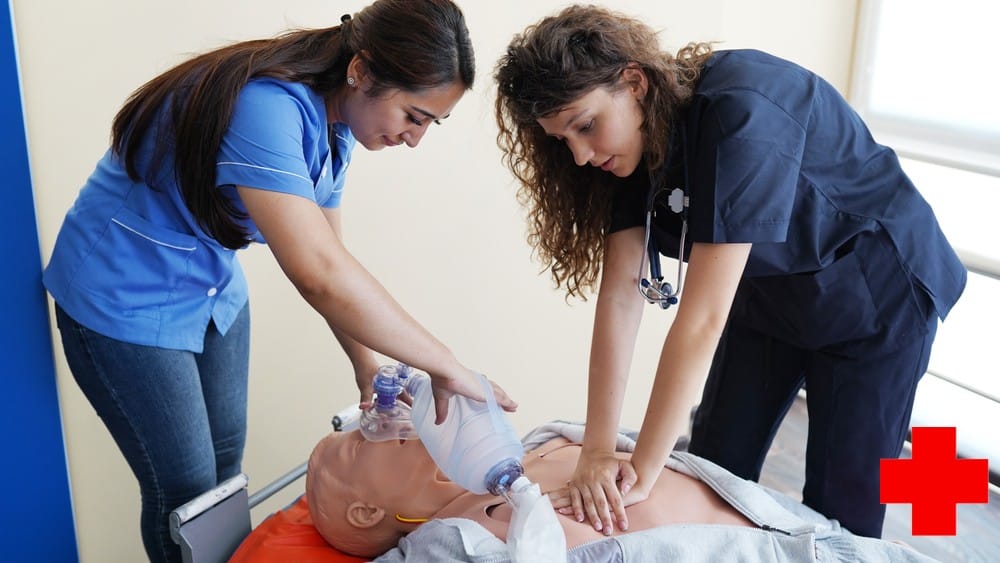Hey Everyone!
Welcome to our comprehensive CCRN Neonatal certification guide.
Have you ever wondered how obtaining a CCRN Neonatal will benefit your Neonatal Intensive Care Unit career and where to begin to acquire such a certification?
This guide will answer your questions about obtaining a CCRN Neonatal certification on your first attempt and look into ways to ensure you pass the CCRN Neonatal certification exam.
This guide will cover:
- CCRN Certification eligibility requirements
- Scheduling for the CCRN Neonatal Certification exam
- How to prepare for the CCRN certification exam?
- CCRN for Neonatal Intensive Care Nursing Renewals
- Why get the CCRN Neonatal Certification?
Additionally, we will look at why obtaining the CCRN Neonatal certification will likely impact your NICU Nurse career.
Let’s dive straight into it!
A Quick Intro

With certifications being a primary requirement by some states, and some employers, for Nursing professionals, you may have heard of the Critical Care Registered Nurse CCRN certification before.
The CCRN certification encourages Nurses to undergo educational programs surrounding caring for critically ill patients and awards professionals with certification following their successful completion of the CCRN certification exam.
Neonatal Nurses have their designation of the CCRN known as the CCRN (Neonatal) certification, which certifies a NICU Nurses knowledge in delivering care to critically ill neonates.
With this certification holding value to NICU Nurses, we discuss how to obtain it below, starting with fulfilling the eligibility requirements.
CCRN Neonatal Certification eligibility requirements

Becoming CCRN (Neonatal) certified will require you to hold an unencumbered RN or APRN license.
If you aren’t familiar with becoming an RN yet, you need to obtain an Associate’s degree in Nursing (ADN) or Bachelor of Science in Nursing ( BSN) before taking and passing the NCLEX-RN examination.
When you’ve received confirmation of passing the exam, the next thing is to look for work experience opportunities.
A year to two worth of work experience suffices for an RN.
To become an APRN, you’d need to take your BSN or APN a step further and earn a Master’s of Science in Nursing (MSN).
You also have the option to earn a Doctor of Nursing program (DNP) qualification.
When that’s complete, you will have to gain some clinical experience before taking and passing an APRN Certification exam.
Once you meet the educational requirements, the American Association of Critical-Care Nurses ( the board that administers the CCRN Neonatal exam) requires you to fulfill one of two clinical practice experience hours.
- Two-year option: Work as an RN or APRN providing care to critically ill neonatal patients for 1750 hours within two years
You should fulfill at least 875 hours of the 1750 hours in the year before you take the examination.
- Five-year option: Work as an RN or APRN providing care to critically ill neonates for 2000 hours in 5 years
You should fulfill at least 144 of those hours in the year before you take the examination.
Once you have fulfilled all the requirements, the next step will be to schedule your CCRN (Neonatal) exam.
Scheduling for the CCRN Neonatal Certification exam

After meeting the eligibility requirements, applying for the CCRN (Neonatal) certification examination is straightforward.
And if you familiarize yourself with the steps beforehand, you can complete your registration process in a matter of hours.
Below are the steps required to secure a place in the exam room as outlined by the American Association of Critical Care Nurse (AACN):
Step 1: Consider your testing options
Before registering for the exam, you must consider the testing options as these may influence how you complete the application process.
The American Association of Critical Care Nurse offers the CCRN (Neonatal) through computer-based testing or paper and pencil examination.
Furthermore, you may take the exam at over 300 testing centers across the United States or through a live proctored exam from a remote location.
Carefully consider the testing method that will best suit your preferences before applying to take the exam.
Step 2: Apply Online
The next step to registering for the exam is to visit the AACN website, go on to the Get Certified page, ensure to choose the CCRN (Neonatal) certification, and follow the prompts thereof.
When registering, you will need to have specific documents readily available for submission, including your RN or APRN license.
AACN will require other personal details, including your name, contact details, and address.
You will also have to provide an email address of a supervisor who can vouch for your licensure and credentials.
Note that if you want to take the paper and pencil exam, you only have the option to register for the exam through a paper application – which can make your exam registration process take anywhere between 2 and 4 weeks.
Step 3: Fees and Discounts
When registering for the exam, you will be required to make a payment immediately after filling in your details.
The testing fee for the CCRN (Neonatal) certification for AACN nonmembers is $360.
However, if you are an existing AACN member, you will obtain a discount and be charged $245.
Step 4: Reserve a date
AACN will confirm your successful application through a confirmation email.
The confirmation email will contain information on how to schedule your exam, and it will include the eligibility period in which you must take the exam.
Furthermore, the email will also contain a link to begin your scheduling process immediately.
Make sure you thoroughly think about the date on which you will be available to sit in for the exam, as you don’t want to find yourself in a situation where you might have to re-register for the exam or even incur cancellation fees.
After choosing your preferred date, AACN will also ask you to specify your preferred computer-based testing option, that is, at a PSI testing center or remotely.
Once all the details you’ve entered surrounding scheduling a date are accepted, you’re all set to take the exam.
How to prepare for the CCRN certification exam?

Preferably, before applying to take the exam, you should already be reasonably confident that you are well familiar with the knowledge tested in the exam to avoid last-minute panic or the risk of failing the exam.
However, if you haven’t gotten off to a great start preparing for your exam, don’t fret; we’ve got some tips to help you get the ball rolling with your exam preparation activities:
Study Resources
Having access to good study resources is a great starting place in working towards feeling confident on the exam day.
And the best part is that AACN compiles all its study resources on its website, so there is no need to search far and wide to access study material.
Some of the study resources offered by AACN include a variety of exam handbooks that range between $16.99 and $100.
Additionally, AACN offers a free exam test plan which features several sample questions to help you understand the kind of questions to expect in the actual exam.
Also, if you are looking to buy books from outside sources, an excellent book to consider is the Neonatal CCRN exam secrets study guide, which covers critical exam knowledge such as cardiovascular, endocrine, renal, gastrointestinal, hematology, and pulmonary.
Practice Exam
If you want to access more practice questions that will help you better familiarize yourself with what to expect on the exam day and reduce anxiety, AACN offers exam practice questions packages.
You have the option to access a free trial, basic, and premium package, all priced differently and all offering access to a select amount of questions, answers, and rationales.
Review Course
The AACN Neonatal CCRN Review Course provides a comprehensive review of all the knowledge areas tested in the CCRN (Neonatal) and CCRN-K exams.
The CCRN Neonatal Certification Review Course features presentation slides covering topics such as professional caring and ethical practice and other topics covered in CCRN test plans.
The course also gives students access to test-taking strategies and provides additional access to practice tests.
Purchasing the course will cost you $199; however, AACN members can get the course at a discounted amount of $159.
After you’ve completed your exam prep, all that’s left to do is take the CCRN Neonatal exam.
The following section will discuss some of the procedures you can expect on the exam day.
Taking the exam

You might need to bring a few documents with you on the exam day, such as your identity document and licensure.
Regardless, make sure to verify the documents expected from you at the door by first looking at the AACN website.
Once seated in the exam room, this will be the time to put all the practice hours you dedicated to working.
After sitting in for the computer-based exam, you can expect to see your results immediately on the screen.
However, if you choose to take the paper and pencil exam, it can take eight weeks to receive your results.
Candidates who have received notification of their exam success will receive their certification by mail between three and four weeks.
After that, your certification will be valid for three years before you must renew it.
CCRN for Neonatal Intensive Care Nursing Renewals

Once the three-year certification period has lapsed, AACN expects certification holders to renew their certification to remain competent.
Certification renewal can be done through the Synergy Continuing Education Recognition Point (CERP) Program or by taking a CCRN exam.
Finally, if you cannot meet the CCRN Neonatal Nursing certification renewal requirements, you can always give up your credential temporarily by applying for inactive status until you can meet the eligibility requirements.
Why get the CCRN Neonatal Certification?

While obtaining the CCRN (Neonatal) certification isn’t mandatory for your healthcare career as a Neonatal Intensive Care Unit Nurse, there are several exciting benefits to getting the certification.
Foremost, having the certification boosts your confidence in your skills, as before you can obtain your certificate, you have to undergo thorough study.
Additionally, Nurses who earn a CCRN (Neonatal) certification make a significantly higher salary per year than Nurses who do not hold the certificate.
Finally, being CCRN (Neonatal) certified can open doors to career advancement opportunities such as promotions or being selected to serve on a policy-making committee.
Conclusion

As explained in this guide, applying for the CCRN Neonatal certification is pretty straightforward, and it can be done in a short period, provided that you understand the steps it takes to achieve your certification.
We hope that this guide has helped you understand all the procedures it takes to obtain a CCRN Neonatal certification.
All the best!
FAQs

Do NICU Nurses get CCRN?
Yes. Nurses working in NICUs can obtain the CCRN Neonatal certification. The CCRN (Neonatal) validates a NICU Nurse’s knowledge of direct care to critically ill neonates. While NICU Nurses don’t need to obtain the CCRN (Neonatal), it offers several career benefits.
How long does it take to become CCRN certified?
According to Best Accredited Colleges, it could take between 4 and 6 years to become CCRN certified. This time frame considers the time it takes to become a Registered Nurse, pass the NCLEX-RN exam, and obtain two years of critical care experience.
How many questions is the neonatal CCRN?
There are 150 questions in the CCRN (Neonatal) exam. From the 150, only 125 receive a score. The remaining 25 are used to obtain data for research purposes.
Is the CCRN exam difficult?
Many Nurses have described the CCRN exam as a tough test that you cannot take lightly. Furthermore, if you assess the questions provided in the practice test, you will deduce that the questions are somewhat rigorous, testing your knowledge and skill in all aspects of critical care.
What is CCRN K certification?
Nurses who work in positions that influence the care of critically ill adults obtain the CCRN K certification. However, they do not work closely or give direct care to critically ill adults. These include professionals such as Clinical Educators or Supervisors.
What is the difference between CCRN and CCRN E?
Nurses providing direct care (often at the bedside) to critically ill patients can obtain the CCRN certification. On the other hand, the CCRN E certification is for Nurses that offer virtual care through TeleICU to patients in remote locations.
What is the passing score on the neonatal?
According to Mometrix, the passing score for the CCRN exam is 89. If you take the computer-based exam at a testing center, you can see whether you have passed or failed immediately.









